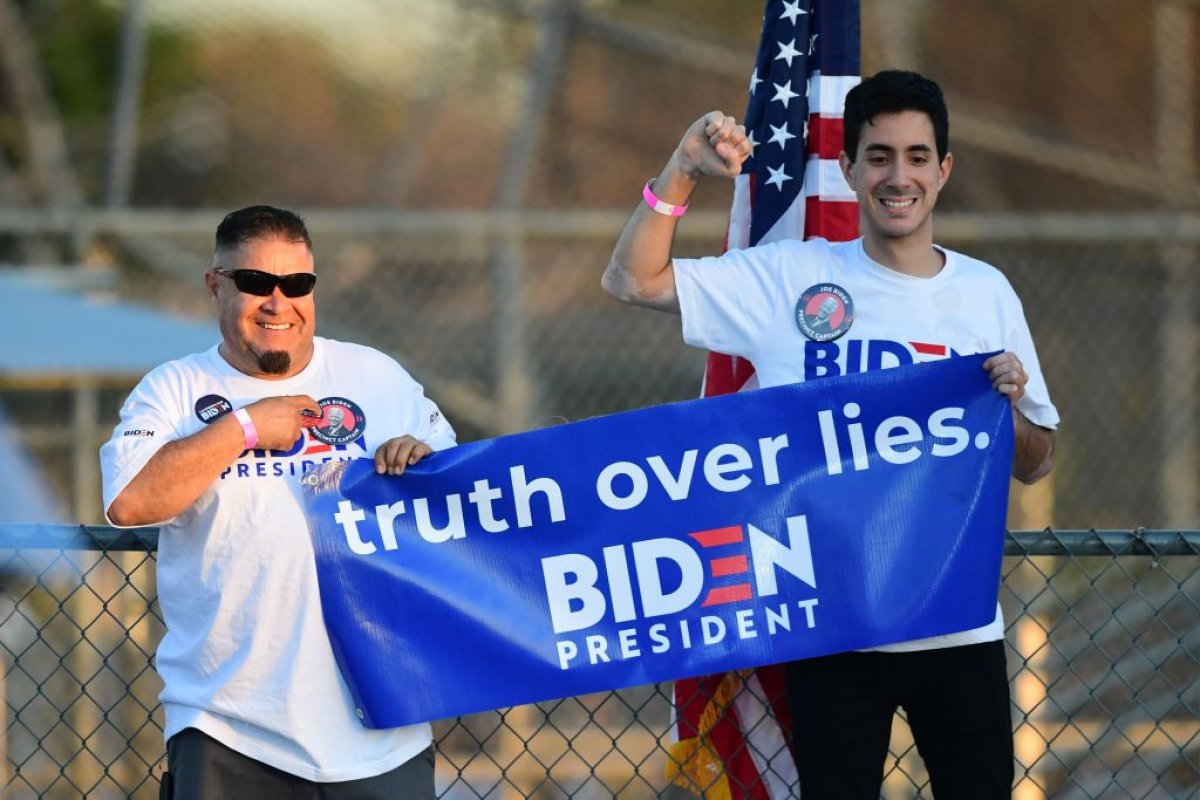Latino voters could swing six battleground states in 2020, a new poll showed, sparking concern for Joe Biden and Democrats.
The poll by Voter Participation Center/Voto Latino showed low enthusiasm among Latinos in states where the population could affect the outcome, particularly among young voters—a finding that Stephen Nuño, a Latino Decisions pollster who conducted the poll, said is concerning for the presumptive Democratic nominee.
The poll surveyed 1200 Latino voters in the six battleground states of Arizona, Florida, Nevada, North Carolina, Pennsylvania, and Texas. Page Gardner, founder of the Voter Participation Center and the Center for Voter Information told Newsweek that taking the pulse of Latinos in those states is important because the burgeoning Latino populations could affect the election and they are the key battleground states not just in the presidential race, but have down-ballot implications. The poll is the first robust sample of Latinos in North Carolina and Pennsylvania this cycle.
"It's code red," Voto Latino founder Maria Teresa Kumar, who specializes in reaching young Latinos, told Newsweek.
The poll found that Latino voters continued to demonstrate lower enthusiasm for Biden's candidacy, with a "somewhat low rate" of 59 percent of Latinos who said they intend to vote, compared with 73 percent of Latino registered voters who said they were certain to vote in February. Only 46 percent of Latino voters under 30 said they plan to vote, a figure that Kumar said jumped out.
"The reason it's code red is that unlike African American households where older family members encourage young people to go vote, in our households it's the opposite," she said. "The fact that 46 percent of youth are open to Biden means they have a lot of work to do because they're the ones who get their parents to register to vote."
Latino Decisions said "there is no doubt" the coronavirus outbreak has dampened voter enthusiasm as real-world concerns supersede everything else. "It's really about demographic outreach and a lot of it is a function of Bernie Sanders dropping out and losing the attention of these groups, where the pandemic hasn't helped," Nuño said.
The poll was conducted online from June 7 to June 19 and has a margin of error of 2.8 percent.
While Biden continues to lead President Donald Trump among Latinos at 60 percent to 25 percent, the poll showed the former vice president's support with the group has fallen since earlier in the cycle. Biden had 67 percent support of those surveyed in a February Latino Decisions poll. He is also underperforming where Hillary Clinton was with the group at the same point in the previous cycle, when she had 73 percent support among Latinos in the summer of 2016.
In a memo, the pollsters wrote that "mere disaffection with Trump is insufficient" to get Latinos to vote for Biden, adding that there is no movement to Trump from the group. Instead, they said that they found a large pool of undecided voters, "most likely votes that Biden has a chance to win, especially younger Latinos," if he can increase his outreach to the voting bloc.
A complicating issue for Democrats is getting hard-hit groups like Latinos who represent part of their coalition to vote during the outbreak, and the poll showed Hispanics express low levels of information about vote-by-mail options, which will be used heavily in the fall.
Only 42 percent of Latinos said they have ever voted by mail or via absentee ballot and two-thirds of in-person Hispanic voters acknowledged they are unfamiliar with the process of how to vote by mail in their state.
The poll suggested additional voter education is needed for comfort and confidence with mail voting to grow. In North Carolina, only 2.5 percent of people voted by mail in 2018, Gardner said, which is why her organization is expanding its vote by mail program "dramatically."
An opening for Democrats may be in the strong support from Latinos for the Black Lives Matter movement and how voting and activism are viewed in concert as affecting change, the poll found.
More than three-quarters of Latino voters support the Black Lives Matter movement after protests exploded across the country in the aftermath of the George Floyd killing by police. Seven-in-ten Latinos also said "racial injustice and violence against black and Latino communities" was the most important or a top reason to vote in November.
Kumar's group saw this dynamic in action as the police brutality protests grew. After registering 10,000 voters in May, Voto Latino expected to register 20,000 in June, at a cost of $140,000. Instead, they exhausted their budget in three days, ultimately registering 98,000 voters and spending $1 million. "They have connected protesting and voting—getting young people to understand to be in the streets but then to also vote is a big shift in this generation, and the most hopeful and inspiring part" of the poll, she said.

Uncommon Knowledge
Newsweek is committed to challenging conventional wisdom and finding connections in the search for common ground.
Newsweek is committed to challenging conventional wisdom and finding connections in the search for common ground.
About the writer
Adrian Carrasquillo is a political reporter for Newsweek reporting on the 2020 election, who has covered national politics and Latino ... Read more
To read how Newsweek uses AI as a newsroom tool, Click here.








